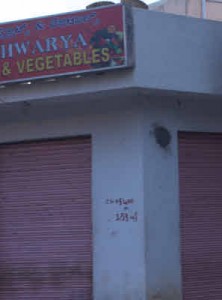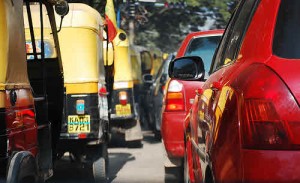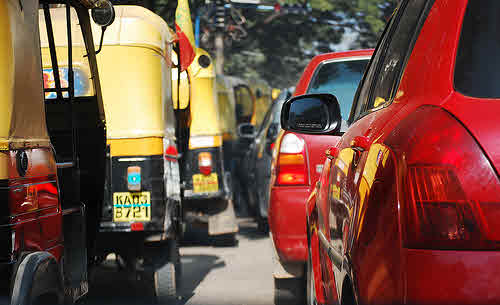by Bijesh Krishnadas
[box]Does the government, in the name of development, have the right to squash the dreams of thousands? Bijesh Krishnadas ponders about this in light of recent developments in Bengaluru, India. [/box] A few months back, I noticed red markings on walls along the road I live on. They seemed to be everywhere – on homes, store fronts and even schools. I saw it on the perimeter wall of the high-rise I live in. Little did I realize that the innocuous looking numbers could become the death knell for many a small time trader and many families. They were the victory smears of development and everything that “India Shining” appeared to lead to. The mentioned road connected two of the so-called IT corridors. This road, the municipal body decided, was not wide enough for the traffic volume. The same body that collects taxes from those residents for their welfare, connived to obliterate their homes and their livelihoods. The BBMP is infamous for its unscientific solutions to infrastructure problems. Scores of trees have been felled in the wake of its development plans. Humongous malls have been allowed to be built in already congested areas. Now, BBMP intends to raze down homes to widen roads in many areas around Bengaluru. The red markings indicated, in meters, the portion of the property that would be demolished to expand the road. The BBMP (Greater Bengaluru Municipal Council) proudly proclaims that the number of properties destroyed – about 32,000 – is a mere 2% of the total number of properties within its jurisdiction.
A few months back, I noticed red markings on walls along the road I live on. They seemed to be everywhere – on homes, store fronts and even schools. I saw it on the perimeter wall of the high-rise I live in. Little did I realize that the innocuous looking numbers could become the death knell for many a small time trader and many families. They were the victory smears of development and everything that “India Shining” appeared to lead to. The mentioned road connected two of the so-called IT corridors. This road, the municipal body decided, was not wide enough for the traffic volume. The same body that collects taxes from those residents for their welfare, connived to obliterate their homes and their livelihoods. The BBMP is infamous for its unscientific solutions to infrastructure problems. Scores of trees have been felled in the wake of its development plans. Humongous malls have been allowed to be built in already congested areas. Now, BBMP intends to raze down homes to widen roads in many areas around Bengaluru. The red markings indicated, in meters, the portion of the property that would be demolished to expand the road. The BBMP (Greater Bengaluru Municipal Council) proudly proclaims that the number of properties destroyed – about 32,000 – is a mere 2% of the total number of properties within its jurisdiction.
How can a municipal council not feel a hint of remorse at leaving so many people homeless and that too without any monetary compensation to rebuild what is left of their homes? Yes, you read it right. There will be no monetary compensation, only something called a TDR (Transfer of Development Rights Certificate) which would give the owner the right to build 1.5 times the area of your property that gets acquired. So if the government took away 300 sq. ft of land, the owner gets the municipal approval to construct 450 sq. ft. of brick-and-mortar property in either the left- over area of the land or any other land that he/she owns. Of what benefit will this be to a labourer who makes 100-200 rupees a day? He has the right to build something that he doesn’t have the money to build! If that isn’t irony, then Nessie is a puppy.
What’s 2% when the results can provide relief to the city’s traffic problems? Every day as I pass those red tilaks, I can’t help ponder what those poor souls will do if the plan is put into action. Where will they live? What happens to all the dreams they built into the homes? I can hardly imagine the agony that every waiting minute must bring to them. All this just so that the rich can drive their fancy cars faster! All this heartlessness so that businesses can showcase the city as an infrastructure paradise!
When did the government gain the right to trash the dreams and aspirations of people, however less privileged they are? This section of society is the largest vote bank for politicians and yet no one bats an eyelid when they are squashed under boots. Of what use is suffrage to them when the government is no longer ‘of the people, by the people and for the people’?
The truth may be even bitter. Nothing will change in spite of this exercise. The BBMP and BDA have completed many multi-crore projects to solve the traffic situation in the last 5 years and none of them has made even a dent on the problem. In spite of the scores of flyovers and underpasses, the city is at standstill every morning and evening at peak hours. The problem gets shifted to the next bottleneck (of which there are too many to count).
BBMP may perhaps be the most narrow-minded governing body in the whole world. Every decision is about today and this moment, never does it consider the future and the unanswered what ifs. Cutting all those trees is bound to affect the weather and rainfall. Where will the city get its daily water needs from? None of the deciding authorities have bothered to stop and consider such questions. A few years down the line, the city will have no water in the catchments or the water table and what then? Will taxpayers’ money fund another round of massive spending on more projects? Most certainly, the effects of those projects will not be fully understood until after the money gets spent.
What exactly will we achieve with wider roads? Let’s try and analyse. Right now, if the roads are narrower, lesser traffic uses these roads. People, at least a few, will leave their cars behind and use public transport or car pool, just so they can avoid driving through traffic jams everyday. I know that’s a slightly uncommon point of view but when it works, it’s a blessing in disguise. Widen the road and you automatically see an increase in traffic volume and the road will get saturated in no time. This has been demonstrated time and again with every flyover and road widening project.
People, at least a few, will leave their cars behind and use public transport or car pool, just so they can avoid driving through traffic jams everyday. I know that’s a slightly uncommon point of view but when it works, it’s a blessing in disguise. Widen the road and you automatically see an increase in traffic volume and the road will get saturated in no time. This has been demonstrated time and again with every flyover and road widening project.
With narrow roads, cars are forced to maintain a modicum of lane discipline. Motorists do cut across to the wrong side of the road and block oncoming traffic, even in the narrow roads, but the effect is immediately perceived. With wider roads, the unruliness of these drivers will become unfettered. The permanent solution to our traffic woes is to ensure that road users are disciplined and know and follow the rules of the road. Enforcement is not about having a few white-and-khaki policemen hiding around the corner to catch a poor transport truck driver. It should be about taking action against anyone who breaks rules and making sure the consequences are felt immediately. Let’s admit it, it’s almost guaranteed that the municipal body will not plan for pedestrian walks or sky-walks. They are yet to learn the lesson that pedestrians are road users too and have a right of way. Wider roads, therefore, mean that pedestrians are put to greater risk. It’s time the upper echelons learned that the solution to traffic problems is not ever expanding infrastructure. No matter how wide the roads get, unless road users are disciplined, nothing will change. Wider roads on the other hand will only lead to more callous behaviour from the public.
Pic : Bijesh Krishnadas
abhisawa – http://www.flickr.com/photos/abhisawa/
[facebook]share[/facebook] [retweet]tweet[/retweet]





